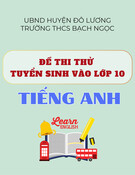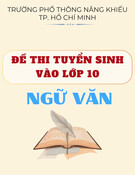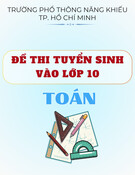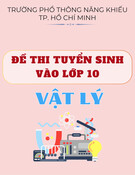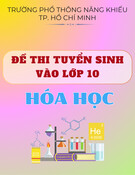
SỞ GIÁO DỤC VÀ ĐÀO TẠO
TỈNH NINH BÌNH
KỲ THI TUYỂN SINH LỚP 10 THPT
Năm học 2025 - 2026
MA TRẬN ĐỀ THI THAM KHẢO
Bài thi: TIẾNG ANH
TT
Nội
dung
Mức
độ
nhận
thức
Tổng
Nhận
biết
Thông
hiểu
Vận
dụng
Vận
dụng
cao
Tỉ lệ
(%)
Thời
gian
(phút)
Tỉ lệ
(%)
Thời
gian
(phút)
Tỉ lệ
(%)
Thời
gian
(phút)
Tỉ lệ
(%)
Thời
gian
(phút)
Tỉ lệ
(%)
Thời
gian
(phút)
1 Phone
tics 634210 5
2 Lexic
o 0084854320 12
3 Gram
mar 6363632120 10
4.1 Cloze-
test 42422110 5
4.2 Readi
ng
compr
ehensi
on
4264654420 15
5 Writi
ng 00218510 720 13
Tổng 20 10 30 16 30 19 20 15 100 60
Tỉ lệ
(%) 20 30 30 20
Tỉ lệ
chung
(%)
50 50
Page 1

SỞ GIÁO DỤC VÀ ĐÀO TẠO
TỈNH NINH BÌNH
KỲ THI TUYỂN SINH LỚP 10 THPT
Năm học 2025 - 2026
Bài thi:TIẾNG ANH
Thời gian làm bài:60 phút (không kể thời gian phát đề)
Mark the letter A, B, C, or D on your answer sheet to indicate the word whose underlined part
differs from the other three in pronunciation in each of the following questions.
Question 1. A. wants B. parks C. stops D. watches
Question 2. A. machine B. much C. church D. change
Question 3. A. put B. unit C. student D. university
Mark the letter A, B, C, or D on your answer sheet to indicate the word that differs from the other
three in the position of primary stress in each of the following questions.
Question 4. A. private B. provide C. arrange D. advise
Question 5. A. fantastic B. tradition C. delicious D. Japanese
Mark the letter A, B, C, or D on your answer sheet to indicate the correct answer to each of the
following questions.
Question 6. Mr. Brown comes to the store_______ for cheese and bread.
A. regular B. regulation C. regulating D. regularly
Question 7. They make sure that the rooms in that resort in Phu Quoc island are ____, even the big
ones.
A. affordable B. afford C. affordability D. affording
Question 8. What will you do to earn _________?
A. life B. a living C. a job D. a career
Question 9. Our tour guide gave us a list of local tourist _______, including museums, parks, and
historical sites.
A. attractions B. buildings C. situations D. schedules
Question 10. He wants to buy an ________ car because he doesn’t have much money.
A. expensive B. affordable C. rich D. wealthy
Question 11. To make your pronunciation better, listen to English speakers and try to __________
them.
A. translate B. understand C. guess D. imitate
Question 12. They haven’t _______ a decision about where to go on their honeymoon.
A. got B. made C. given D. taken
Question 13. Parents should help teenagers to _______ their own decisions on their future career.
A. take B. bring C. pay D. make
Question 14. My close friend has a strong ________of responsibility, so I can always rely on him.
A. personality B. possession C. sense D. deal
Question 15. Do you know who’s _______ his pottery workshop?
Page 2

A. taking over B. bringing out C. passing down D. turning down
Mark the letter A, B, C, or D on your answer sheet to indicate the correct answer to each of the
following questions.
Question 16. She ________ in this city since she moved in 2000.
A. lives B. has lived C. is living D. lived
Question 17. My teacher recommended _____used batteries to the e-waste collection spot.
A. to take B. taking C. to taking D. taken
Question 18: If you study harder, you _______ pass the final exam.
A. would B. can C. could D. should
19.__________ the danger, many people wanted to take part in the excursion.
A. Despite B. Although C. Because D. Because of
Question 20. That flight ticket is ______ than this one
A. as expensive B. more expensive C. the most expensive D. the expensive
Question 21. He told me he would visit his parent ______
A. tomorrow B. the next day C. the previous day D. the day before
Question 22. I wish I___________ how to operate this machine!
A. know B. knew C. will know D. have known
Question 23. There is somebody ________ the middle of the room.
A. among B. on C. at D. in
Mark the letter A, B, C, or D on your answer sheet to indicate the option that best completes each of
the following exchanges.
Question 24. Linda is apologizing to Ann for coming to the meeting late.
- Linda: “I’m sorry for coming to the meeting late.” – Ann: “_______”
A. Yes, I’d love to. B. No, it’s a waste of time.
C. Please don’t let it happen again. D. Yes, I will.
Question 25. Would you mind If I borrowed your pen, please?
A. Thank you B. Of course, here you are C. Cheer D. That sounds nice
Read the following announcements and circle the letter A, B, C or D to indicate the correct option
that best fits each gap.
Opportunities for (26) ________ work in Southey village Library
● one thing you could do is get involved in collecting books (times to be arranged)
● another thing you could help is to keep records of books up to date
● Library is in (27) ________ the west Room in the village hall
Help for individuals needed next week
● Mrs. Carroll needs (28) ________ live in my neighborhood a lift to the hospital
● Work in the garden at Mr. Selsbury’s house
Question 26. A. volunteers B. voluntary C. voluntarily D. volunteered
Question 27. A. the B. no article C. an D. a
Question 28. A. whom B. whose C. who D. what
Look at the sign or the notice. Choose the best answer (A, B, C, or D. for each of the following
questions.
Question 29. Look at the signs. Choose the best answer for the question.
A. Dogs are not safe for children in this play area.
B. Dogs cannot be taken into this place as it is a children’s play area.
C. Don’t let your children play here because of the dogs.
D. Dogs are not allowed to play with children in this area.
Page 3

Question 30. What does the sign say? Choose the best option.
A. Only 15-17 people can enter the place from 8 p.m.to 10 p.m.
B. Only teenagers who are over 15 are allowed to enter this place.
C. The venue is open to all teenagers under the age of 17.
D. Teenagers aged 15-17 can visit the venue from 8 p.m.to 10 p.m.
Read the following passage and mark the letter A, B, C, or D to indicate the correct answer to
each of the questions.
In the earliest times children got their education directly from parents and other adults. They learned
mainly skills for survival. Adults passed down this knowledge through spoken language. Eventually
cultures around the world began inventing writing. As societies developed they set up schools to teach
reading, writing, maths and other subjects.
The first schools were usually just for boys. Most of the students came from rich and powerful
families. Often the purpose of their education was religious training. In many cultures the religious
leaders formed the highest level of society. Some schools had other purposes as well. Many schools
focused on military training. Sometimes youths attended special schools to learn the art of public
speaking. These skills were meant to help them become future leaders.
Most girls received their education at home. They learned cooking, sewing and other useful skills.
Over time education became available to more people, not just the rich and powerful. The governments
of some countries set up public systems of education in the 1800s.More schools opened to girls.
During the 1900s marks, or grades, became a new measure of learning. Testing became a regular part
of formal education. As education became more important to people, teachers' colleges opened. The
requirements for becoming a teacher became stricter. Teaching became a highly respected profession.
Question 31. The word “survival” in the passage is closest in meaning to__________.
A. eradication B. subsistence C. extinction D. death
Question 32. The word “they” in the passage 3 refers to________.
A. girls B. people C. boys D. students
Question 33. Which of the following is NOT true according to the passage?
A. The first schools were usually just for boys from rich and powerful families.
B. Art of public speaking was one of the skills that help youths become future leaders.
C. During the 1900s, testing became a regular part of formal education.
D. In the earliest times, knowledge was passed down through written records.
Question 34. What became a new measure of learning during the 1900s?
A. Testing and marks or grades. B. Teachers' colleges and stricter requirements.
C. Public systems of education. D. Religious training and leadership skills.
Question 35. The best title for the passage could be________.
A. Education in the Earliest Times. B. The Development of Education
C. Education in Modern Times D. Testing - a Regular Part of Education
Many people worry about the effects of television on family life in the United States. In the average
home, the TV is on more than six hours a day. But do people always keep their mind on the programs?
And do people who watch TV really spend less time on other free-time activities?
A study by some New York researchers found out that watching TV is the most popular free-time
activity in the United States. More than 70% of Americans say that they watch TV every day, or almost
every day. The second most popular activity is reading the newspaper. Listening to music at home is
third. Talking on the phone to friends and relatives is fourth. Exercising or jogging is fifth.
Surprisingly, television does not seem to take time away from free-time activities at home. Six out of
ten people said that when the TV is on, they seldom pay attention to it . During a typical television
Page 4

program, people may eat dinner, do housework, read a newspaper or magazine, or talk or read to their
children. The TV becomes 'background music'.
The researchers learned that in some ways Americans are very traditional. Teenagers and single people
may be interested in activities and excitement outside the home. However, eight out of ten Americans
like to spend their free time at home with family member and friends.
(Adapted from "Reading Explorations")
Question 36. What is the passage mainly about?
A. The bad effects of TV on American family life
B. The fact that Americans are very traditional
C. Americans’ television viewing habits
D. How Americans spend their spare time
Question 37. According to the research, which is the most popular leisure activity in America?
A. listening to music B. watching TV
C. going out with friends D. doing housework
Question 38. What does the word "it" in paragraph 3 refer to?
A. family activity B. free-time activity
C. television D. TV viewers
Question 39. What do eight out of ten Americans prefer to do with their free time, according to the
passage?
A. Spend time outside the home B. Spend time outside the home
C. Engage in activities and excitement D. Spend time at home with family and friends
Question 40. In the passage, the word "seldom" is closest in meaning to ____________.
A. often B. rarely C. quickly D. loudly
Choose the sentence that is closest in meaning to each of the sentences given.
Question 41. I was doing my homework, at that time my sister was reading books.
A. While I was doing my homework, my sister was reading books.
B. While I had done my homework, my sister was reading books.
C. While I was doing my homework, my sister reads books.
D. While I did my homework, my sister read books.
Question 42. The teacher asked the boy: "Do you like playing sports in your free time?”
A. The teacher asked the boy if he liked playing sports in his free time
B. The teacher asked the boy if you liked playing sports in his free time
C. The teacher asked the boy if he likes playing sports in his free time
D. The teacher asked the boy if he liked playing sports in your free time
Question 43. She gave me a nice hat on my birthday
A. I am given a nice hat on my birthday.
B. I was given a nice hat on my birthday.
C. A nice hat is given to me on my birthday.
D. A nice hat was given me on my birthday.
Question 44. Unless she works hard enough, she will fail the exam.
A. She will fail the exam if she works hard enough.
B. She won’t fail the exam if she doesn’t work hard enough.
C. She won’t fail the exam if she doesn’t work hard enough.
D. She will fail the exam if she doesn’t work hard enough.
Mark the letter A, B, C or D on your answer sheet to indicate the sentence that is best combined
from two given sentences.
Question 45. Her living conditions were difficult. However, she studied very well.
A. She studied very well because of her difficult living conditions.
B. She studied very well, so she lived in difficult conditions.
C. Because her living conditions were difficult, she studied very well.
D. Although she lived in difficult living conditions, she studied very well.
Page 5

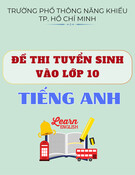
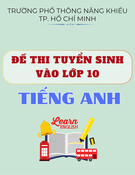

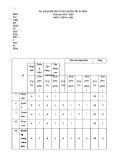
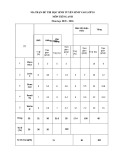
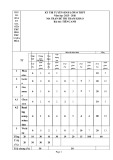


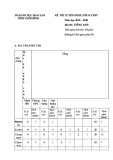
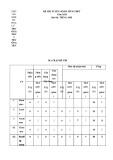
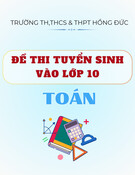
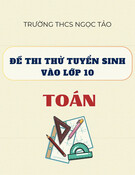
![Dàn ý và bài văn mẫu nghị luận xã hội ôn thi vào lớp 10: Tài liệu [mô tả/định tính]](https://cdn.tailieu.vn/images/document/thumbnail/2025/20250824/levanphuong15081979@gmail.com/135x160/23851756089220.jpg)
